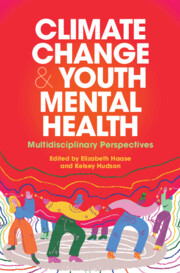Book contents
- Climate Change and Youth Mental Health
- Climate Change and Youth Mental Health
- Copyright page
- Contents
- Figures
- Tables
- Textboxes
- Contributors
- Preface and Introduction
- Considerations
- Acknowledgments
- Part I Conceptual Foundations of Climate Distress in Young People
- Chapter 1 Climate Distress among Young People
- Chapter 2 Definitions and Conceptualizations of Climate Distress
- Chapter 3 Psychiatric Perspectives on Youth Climate Distress
- Chapter 4 Developmental Perspectives on Understanding and Responding to Mental Health Impacts of Climate Change on Young People
- Chapter 5 Neuropsychiatric Perspectives on the Biology of Anxiety and Youth Climate Distress
- Chapter 6 Psychoanalytic and Relational Perspectives on Youth Climate Distress
- Chapter 7 Understanding the Role of Trauma and Dissociation in Youth Responses to Climate Crises
- Chapter 8 Cognitive Behavioral Principles for Conceptualizing Young People’s Eco-Emotions and Eco-Distress
- Chapter 9 A Research Agenda for Young People’s Psychological Response to Climate Change
- Part II Multidisciplinary Perspectives on Youth Climate Distress
- Appendix A Resource List for Educators
- Appendix B Costs and Benefits of Activism Scale
- Index
- References
Chapter 8 - Cognitive Behavioral Principles for Conceptualizing Young People’s Eco-Emotions and Eco-Distress
from Part I - Conceptual Foundations of Climate Distress in Young People
Published online by Cambridge University Press: aN Invalid Date NaN
- Climate Change and Youth Mental Health
- Climate Change and Youth Mental Health
- Copyright page
- Contents
- Figures
- Tables
- Textboxes
- Contributors
- Preface and Introduction
- Considerations
- Acknowledgments
- Part I Conceptual Foundations of Climate Distress in Young People
- Chapter 1 Climate Distress among Young People
- Chapter 2 Definitions and Conceptualizations of Climate Distress
- Chapter 3 Psychiatric Perspectives on Youth Climate Distress
- Chapter 4 Developmental Perspectives on Understanding and Responding to Mental Health Impacts of Climate Change on Young People
- Chapter 5 Neuropsychiatric Perspectives on the Biology of Anxiety and Youth Climate Distress
- Chapter 6 Psychoanalytic and Relational Perspectives on Youth Climate Distress
- Chapter 7 Understanding the Role of Trauma and Dissociation in Youth Responses to Climate Crises
- Chapter 8 Cognitive Behavioral Principles for Conceptualizing Young People’s Eco-Emotions and Eco-Distress
- Chapter 9 A Research Agenda for Young People’s Psychological Response to Climate Change
- Part II Multidisciplinary Perspectives on Youth Climate Distress
- Appendix A Resource List for Educators
- Appendix B Costs and Benefits of Activism Scale
- Index
- References
Summary
Young people’s ecologically related thoughts, emotions, behaviors, and physical sensations arise alongside a multitude of factors in their internal and external environments. This can be complex to understand and organize in therapeutic settings. Cognitive behavioral frameworks can be useful for understanding distress in young people and can encourage cognitive, emotional, and behavioral flexibility in their responses. This chapter provides an approach to eco-related psychological distress based on cognitive behavioral theory that can be used across a range of presentations. An overview of cognitive behavioral theory is provided, with an explanation about how it can provide insight into what can exacerbate and ameliorate unhelpful levels of eco-distress. Two examples of case conceptualizations are offered – one showing impairing eco-distress and one showing constructive eco-distress. The strengths and limitations of cognitive behavioral case conceptualizations are discussed.
- Type
- Chapter
- Information
- Climate Change and Youth Mental HealthMultidisciplinary Perspectives, pp. 148 - 167Publisher: Cambridge University PressPrint publication year: 2024



